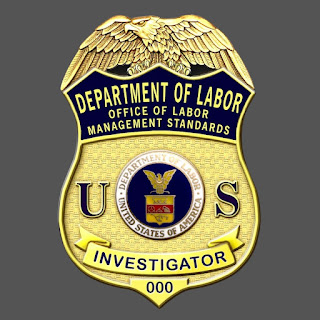"I'm an investigator with the Wage and Hour Division of the Department of Labor. I'm here to conduct an investigation into how your pay your employees." He then shows you his badge, and asks to see the following:
Records showing the business's annual dollar volume of transactions in in interstate commerce to establish that the DOL has jurisdiction; and
Payroll and time records for the past three years.
With that, you're off the races in a DOL wage and hour investigation. The investigator will seek to determine if you've properly classified your employees as exempt or non-exempt, and if you've met your minimum wage and overtime obligations.
What do you do now?
Step One — As soon you see the badge, or, if the investigator was kind enough to give you heads up instead of just showing up — call your employment lawyer. You have the legal right to be represented by an attorney at all points during the investigation. We employment lawyer know the ins and outs of the Fair Labor Standards Act; we should be the ones interacting with the government on all issues since we know how to spin facts to put you and your business in the best light. We can also determine the scope the investigation so that we can narrow the scope of the documents you'll need to gather and produce. We can also discuss deadlines.
Step Two — Gather documents. Now is not the time to slow play or to hide the ball. Appearance might not be everything in government investigations (facts also have a large role to play), but they matter more than you might think. If an investigator thinks you're hiding something, he'll dig deeper than he or she otherwise might have. The more they dig, the more likely they are to find problems. More problems, more money. It's important to be cautiously comprehensive, but it's also important to avoid producing documents that are non-responsive, privileged, or confidential. Again, this is where it's important to work with your employment counsel to ensure that you're not turning over any more than you have to.
Step Three — Make employees available for interviews, but not right away. The DOL investigator will interview employees to verify your payroll and time records, to identify workers' duties to determine which exemptions apply (if any), and to confirm that minors are legally employed. Unless it absolutely cannot be avoided, I want the opportunity to speak to and prep these interviewees before their interviews for two reasons: 1.) I want to know what the possible problem areas are before the DOL does; and 2.) if possible, I want to be able to talk to the witness ahead of their interviews to make the business look as good as possible within the bounds of the truth.
Step Four — Review and evaluate the investigator's conclusions. This is when you (or, better practice, your lawyer) gets to have your say. Did the investigation result in proposed payment of back wages to your employees? Do you agree or disagree? Is the DOL willing to negotiate the amount. If not and you're not ready to pay the amount claimed to be owed, you better be prepared for the Secretary of Labor to file an enforcement action in federal court, at which point you may not just owe back pay to your employees, but also liquidated damages, and attorneys' fees to your lawyer. We don't mind the fees, but you might.
Step Five — Update your wage and hour practices (if necessary). Every DOL investigation is a learning process. The issue isn't just what did you do wrong, but how are you going to do better and fix it moving forward. How will you reclassify workers? How will you ensure that all off-the-clock is captured? What records were you missing that you now need to start keeping? This is where you need to lean on your employment lawyer to fix whatever needs it.
Those are the five steps you should take. The one step you should never take? Ignore the DOL. Nothing good ever comes from ignoring a government investigation. They have access to subpoenas, warrants, and contempt proceedings. Even if you're guilty as sin, you'll only make a bad situation worse by doing nothing.

